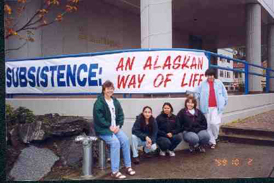Alaska Native Subsistence
Rights
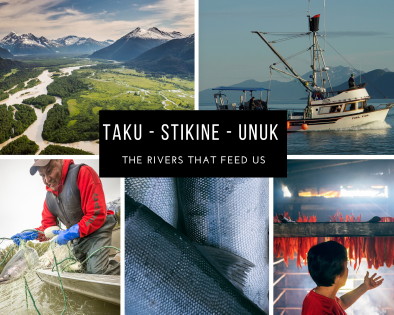
Salmon beyond Borders (Facebook)
Salmon beyond Borders (Website)
The Taku, Stikine, and Unuk rivers are central to life, culture, commerce, sustenance, and ways of life in this region - and home to several Indigenous Nations, including the Tlingit and the Tahltan - linking about 80,000 people in many communities on both sides of the U.S.-Canada border. These rivers are hotspots of biodiversity, climate refugia, and birth all five species of wild Pacific salmon - and serve as economic powerhouses that contribute $48 million annually to Southeast Alaska's economy. B.C. is feverishly rushing through massive open-pit gold and copper mines, including their colossal toxic waste storage facilities, at the headwaters of shared, iconic salmon rivers. This is happening without the meaningful input of communities and Tribes downstream in Alaska, and despite a global push to ban earthen mine tailings dams.
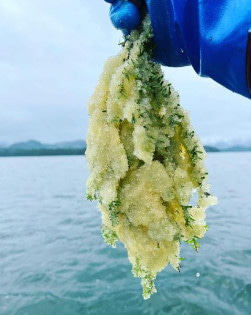
"Gunalchéesh ![]() " Yéil Ya-Tseen (Instagram)
" Yéil Ya-Tseen (Instagram)
Herring Egg subsisting in Sitka, Alaska April 10, 2021
Yéil Ya-Tseen (@nicholasgalanin) • Instagram
Keep updated
- Herring Protectors (Facebook)
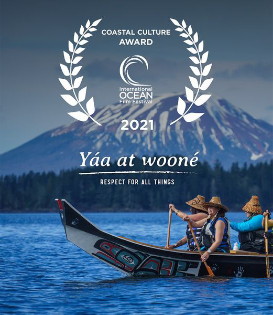
Trailer: Yáa at Wooné (Respect for All Things)
2021 International Ocean Film Festival Kicks Off Next Week; Winners Announced (4/7/2021)
With the winning entries to the 2021 International Ocean Film Festival recently announced, you’ll be able to see those movies — and many more — beginning April 15th. The virtual festival runs from April 15th to May 2, 2021. For more info and to purchase presale tickets, go to intloceanfilmfest.org
Yéil Ya-Tseen shared a Facebook post. (Screen Capture)
Click link for Herring Rock Water Protectors (Facebook video 2/5/2019)
The herring of Sitka Sound are disappearing. Learn why herring are culturally
and ecologically critical to the people of Southeast Alaska.
Protect the Herring! Donate to Sitka Tribe of Alaska link in FB video discription.
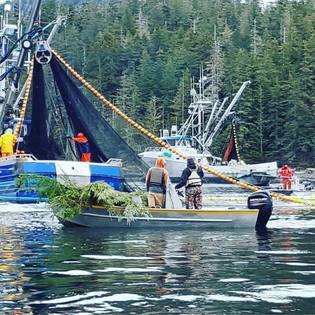
Yéil Ya-Tseen shared a Facebook post by Tommy Gee. (Screen Capture)
"It is a serious issue happening in Sitka this week. I was about to start cast nets in waters less than 50 ft deep when these guys showed up in the bay and pretty much took every available herring right under us, and right over us." Tommy Gee
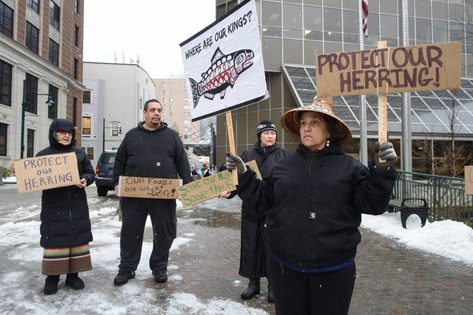
Nancy Keen, right, Vivian Mork, Marvin Willard and Rosita Worl, left, hold a protest outside the Dimond Courthouse as a court hearing between the Sitka Tribe of Alaska and the Department of Fish and Game on herring limits in Sitka Sound takes place inside on Tuesday, Feb. 18, 2019. (Michael Penn | Juneau Empire)
Tribe takes state to court in attempt to protect herring
Tribe of Sitka members hope to change the way fishery is managed
By Alex McCarthy (Juneau Empire Feb 21, 2019)
Alaska Native Subsistence Rights Summer 2012 - Akiak elders told families to fish despite government ban From Kyle Hopkins (Anchorage Daily News, June 22nd, 2012)
Emergency Subsistence Fishing Situation for Alaska's Yup'ik Peoples Continues (Statement from the Akiak Native Community and Akiak IRA Council)
Traditional Alaska Native Fish Harvest Blocked By Government Agencies; Alaska Fish and Game and US Fish and Wildlife Service Confiscating Fishing Nets and Salmon caught; Native elders cite mismanagement and global warming as primary threat to fish population
Akiak - Facing arrest, fines, and seizure of foods and fishing nets by the Alaska Department of Fish and Game and US Fish and Wildlife Troopers, Alaska Native people took to their boats this past Wednesday to stave off a food security emergency. Following orders of village elders, boats filled with men, women, and children fished along the Kuskokwim River in Southwest Alaska on the day an original seven-day river closure was to lift.
The conflict began after the Alaska Department of the Fish and Game and US Fish and Wildlife Service went against the nearly unanimous vote by the Kuskokwim River Salmon Management Working Group, a working group organized by the agency, to immediately open the fishery after an initial agreed upon seven-day closure of the river. The commercial fisheries representative on the working group was the only non-supporting vote of the opener.
"Fish and Game issued citations and fishing nets were cut up, torn and taken away including the fish by enforcement officers," said Mike Williams, a member of the Akiak Native Community and the Kuskokwim River Salmon Management Working Group.
Elders and tribal leaders across Alaska called the government decision to extend the river closure by an additional five days a violation of trust and a threat to sovereign fishing rights.
Ivan M. Ivan, Chief of Akiak said that "this enforcement practice toward our tribal citizens is totally inhumane as the Elders have stated. It is violating our basic human rights as first peoples of this land and first protectors of our resources. The Tribal Council will work hard to protect our resources and our land as we have done for over 10,000 years. We have done this because there were many people from the river who stated that they did not have any fish yet hanging for drying on their racks. This is true from the mouth of the river to the headwaters of the Kuskokwim River."
"All of the Alaska Native Peoples must protect their way of life, lands and waters," he continued. "The Elders have directed their fishermen to fish without any fear of breaking laws. They said that putting up fish for their survival is not breaking the law. It is just common sense that they have been taught by the great teachers before others showed up."
Village elders and leadership are pointing to climate change, and lack of respect for thousands of years of management and tribal sovereignty as the leading factors for the face off. Villages from Tuluksak all the way down to Tuntutuliak are involved. The tribes in the area are going to continue to meet to address the restoration of the Chinook salmon for the future.
After a long cold winter, this harvest time is crucial for much needed dried fish and the villages need enough fish stored for the upcoming winter. The Kuskokwim River stretches From Bering Sea, 702 miles through Southwest Alaska to the headwaters of Mt. Denali. It is the ninth largest river in the United States and the longest free flowing river in the Country.
